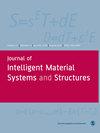Active vibration hybrid control strategy based on multi-DOFs piezoelectric platform
IF 2.2
3区 材料科学
Q3 MATERIALS SCIENCE, MULTIDISCIPLINARY
Journal of Intelligent Material Systems and Structures
Pub Date : 2023-12-29
DOI:10.1177/1045389x231198789
引用次数: 0
Abstract
With the increasing requirements for vibration isolation in multiple degrees of freedom (multi-DOFs), active control strategy is becoming more meaningful. However, the vibration isolation performance is limited by the time delay of feedback control, and cannot meet higher requirements. Therefore, this paper proposes a multi-DOFs active vibration hybrid control (AVHC) strategy based on a piezoelectric platform. The AVHC integrates the adaptive feedforward control based on the modified recursive least squares (MRLS) algorithm, and the feedback control based on the integral force feedback (IFF) algorithm. To achieve advanced response, the ground-based vibration signal is offset by the MRLS algorithm. To further reduce the coupling of multi-DOFs, the feedback and feedforward coordinates are fused through the matrix transformation, and the signals are linearly superimposed by the AVHC. The experimental results show that the AVHC can further reduce the resonance peaks of the three translational directions ( X/ Y/ Z) compared with the feedback (FB) control. The resonance peaks are reduced from 14.6 dB (FB) to 3.11 dB (AVHC), from 14.56 dB (FB) to 5.14 dB (AVHC), and from 12.44 dB (FB) to 3.78 dB (AVHC) in X/ Y/ Z directions, respectively. The attenuation rates are improved by 73.36%, 66.19%, and 63.10% in X/ Y/ Z directions, respectively.基于多自由度压电平台的主动振动混合控制策略
随着对多自由度(multi-DOFs)隔振要求的不断提高,主动控制策略变得越来越有意义。然而,隔振性能受限于反馈控制的时间延迟,无法满足更高的要求。因此,本文提出了一种基于压电平台的多自由度主动振动混合控制(AVHC)策略。AVHC 集成了基于修正递归最小二乘(MRLS)算法的自适应前馈控制和基于积分力反馈(IFF)算法的反馈控制。为了实现先进的响应,地面振动信号被 MRLS 算法抵消。为进一步降低多自由度的耦合,反馈和前馈坐标通过矩阵变换进行融合,并通过 AVHC 对信号进行线性叠加。实验结果表明,与反馈(FB)控制相比,AVHC 可以进一步降低三个平移方向(X/ Y/ Z)的共振峰。在 X/ Y/ Z 方向上,共振峰值分别从 14.6 dB(FB)降低到 3.11 dB(AVHC),从 14.56 dB(FB)降低到 5.14 dB(AVHC),从 12.44 dB(FB)降低到 3.78 dB(AVHC)。X/ Y/ Z 方向的衰减率分别提高了 73.36%、66.19% 和 63.10%。
本文章由计算机程序翻译,如有差异,请以英文原文为准。
求助全文
约1分钟内获得全文
求助全文
来源期刊
CiteScore
5.40
自引率
11.10%
发文量
126
审稿时长
4.7 months
期刊介绍:
The Journal of Intelligent Materials Systems and Structures is an international peer-reviewed journal that publishes the highest quality original research reporting the results of experimental or theoretical work on any aspect of intelligent materials systems and/or structures research also called smart structure, smart materials, active materials, adaptive structures and adaptive materials.

 求助内容:
求助内容: 应助结果提醒方式:
应助结果提醒方式:


